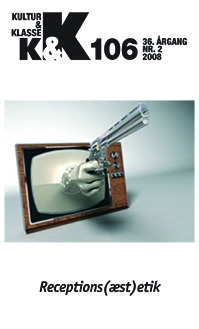Foruroligende etik i Heinrich von Kleists »Michael Kohlhaas«
DOI:
https://doi.org/10.7146/kok.v36i106.22025Nøgleord:
Foruroligende, etik, Heinrich von Kleists, Michael KohlhaasResumé
Disquieting Ethics in »Michael Kohlhaas« by Heinrich von Kleist:
This article argues that the concept of evil takes a central place in the exploration of the Kantian ethics in Heinrich von Kleist’s novella »Michael Kohlhaas«.
Maria Jørgensen argues that not only is the famous duty to which Kohlhaas finds himself obliged conceived in accordance with Kant’s ethics of duty, but also the description of Kohlhaas’ subjectivity in general is constructed by means of Kantian terms. Kleist’s text makes use of concepts such as duty, freedom, pathology, universality and the sublime in order to construct Kohlhaas as an inherently decentered subject. Furthermore Jørgensen argues that the emptying of the concept of the Good in Kantian ethics surfaces in Kleist’s novella as a hitherto unnoticed tendency to a certain tautologisation in Kohlhaas’ qualitative judgments.
In the final section of the article the evil act in »Michael Kohlhaas« as an act of freedom, »Aktus der Freiheit«, is investigated with a departure in the Kantian concept of diabolical evil in Religion innerhalb der Grenzen der bloßen Vernunft. If Kohlhaas’ first attempt to act ethically is contaminated by the self-interest which sticks to his initial duty to secure redress for the wrongs done to him and his fellow citizens by the Junker von Tronka, his last act of refusing to negotiate with the Elector of Saxony functions as a purely ethical act in Kantian terms. Kohlhaas’ act can be seen as an ethical act as it neglects the subject’s pathology, which according to Kant can only be done by an act of reason. Furthermore the act is in keeping with the criteria which Kant, according to Alenka Zupančič, delivers in the famous footnote on the execution of Louis XVI in Metaphysik der Sitten: The act is characterized by being purely formal, it arises from a maxim, and it is first of all an act of freedom. This article thus argues that »Michael Kohlhaas« evidently contains a fulfilled ethical act in Kantian terms, but that this act must be found in quite another place than previously assumed.
Downloads
Publiceret
Citation/Eksport
Nummer
Sektion
Licens
Tidsskriftet følger dansk ophavsret.


